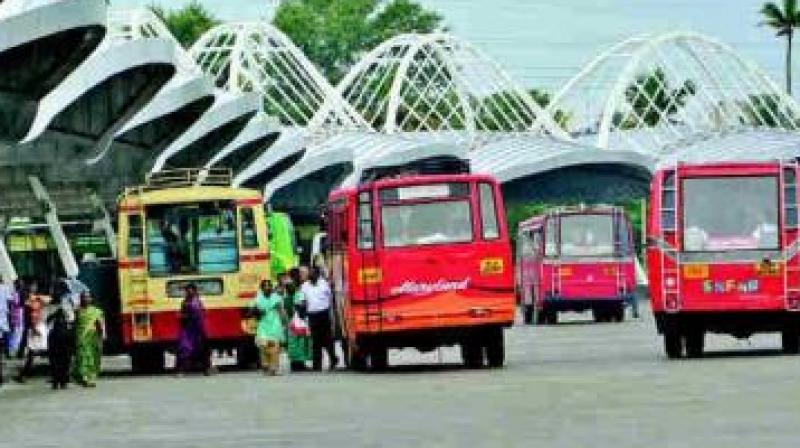New GPS enabled tickets for TSRTC buses efficient and punctual

Hyderabad: The Telangana state government has initiated an experiment to streamline the TSRTC long-distance bus services to make them effective and punctual. In this venture, the conductors will be positioned at the bus stations/stops instead of being in the buses.
Conductors will be given Intelligent Ticket Issue Machines (I-TIMS), which are GPS enabled. By this, the passengers in the bus stations/ stops will get to know the arrival time of the buses and the number of seats available in each bus, in advance. Passengers won't have to wait for buses for hours. Conductors will be issuing tickets at the bus stations/ stops.
The experiment is bei-ng run on a pilot basis on the Nalgonda-Surya-pet route and plans are underway to extend it to other major long-distance routes soon. Howe-ver, the major drawback noticed in the experiment on the Nalgonda-Suryapet route was that there was a need to deploy more conductors in the bus stands/ stops, as the existing number fell short. But officials are justifying this, on the grounds that the deployment of conducto-rs would come down significantly once the initi-ative was extended to the entire state. “At present, we are experimenting this only on the Nal-gonda-Suryapet route, which is a 50-km stretch. Since it has been confi-ned to only the Suryapet depot, we need to deploy 23 conductors on this route because there are 23 bus stops in between.
“Earlier, we needed 17 conductors. Now, besides the 23 conductors, two operators have been appointed for technical assistance to the conductors. If we extended the initiative to all the depots, the number of conductors would come down as all the depots operated buses on similar routes. Hence conductors of the respective depots could be distributed rationally across all the routes," said Somarapu Satyanarayana, chairman, TSRTC.
The I-TIMS project works like a chain system. A conductor at the first stop issues the tickets. Once he closes the system, the information will be passed on to the GPS device held by the conductor at the next stop. With this, passengers at the second stop would come to know the time when the bus would reach the stop and also how many vacant seats were left. Similarly, the information would be passed on till the last stop.
However, the TSRTC has to first address the connectivity issues before extending the initiative to the entire state. This is because the semi-urban and rural areas face connectivity issues due to which the GPS devices would be unable catch the signals. This could prove to be a stumbling block to the new venture.

